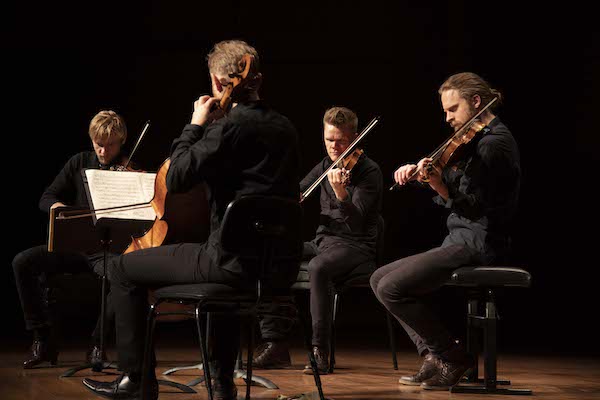Danish Quartet illuminates the twilight of late Beethoven

The Danish String Quartet’s cycle of the complete Beethoven quartets has reached the twilight point. Sunday afternoon in Alice Tully Hall, the Quartet delivered the penultimate concert by playing two of the great, late works, the Op. 132 Quartet in A minor and the B-flat Major Quartet, Op. 130, complete with the Op. 133 Grosse Fugue as the final movement.
Presented by the Chamber Music Society of Lincoln Center, this was a remarkable concert of remarkable music. These works defy specific comprehension. They are full of powerful and compelling feelings that are beyond the limits of normal vocabulary—as personal as anything in the classical repertoire yet also as abstract, unique music that is both absolute and full of heart.
The Danish Quartet played both works with a beauty that was serene and vital. There’s something unquantifiable about playing like this, as there is with Beethoven himself. One can look at a score and fit individual notes into a relationship to a key, or series of chords, just as a rhythm would fit into a larger metrical schema. As the Danes played, one could hear the rise and fall of a phrase, the development of a slow crescendo. More, one could hear how ideal the phrase was and how relaxed it sounded—as if there was only one possible way to play the music and, with that, no anxiety over how to interpretive any given moment. When the Danish Quartet plays, everything sounds right and both composer and musicians make it seem effortless.
Beethoven in general, and the late pieces in particular, are full of the insoluble complexities of human experience, that peace and conflict, love and hate, confidence and fear, are best appreciated in relation to each other. Completely deaf by this point, his ears only captured what was his mind. The Op. 130 and 132 Quartets use the obsessive manipulation of tiny phrases and rhythms as structure and pure, mercurial inner life as form.
What was uncanny about Sunday’s performance was how the Danish Quartet sounded so relaxed and smooth. There is a plainness to their sound and playing that is remarkable and beautiful. The idea that some passage might call for additional emphasis or that the instrument might benefit from a specialized bowing seems superfluous to them.Their approach is holistic, the results are realizations of the gestalt.
The pace was excellent throughout. The Quartet’s playing of each individual line was fluid,and so was the overall forward motion, a flow that not only seemed without friction but also with a constant, lithe momentum. The beauty of their sound was not just pristine tone production but hearing the music as extended thinking, with an extemporaneous vitality. That their tempos were mostly slower than often heard heightened this sensation—every thought and intention was clearly stated even as it loped past the ears.
The Danes seemed somewhat closer to the Op. 132 quartet than the Op. 130. The inner qualities of the A minor quartet came through from the start, the musicians weren’t locked into the deceptively standard form of the opening Assai sostenuto – Allegro movement. Although Beethoven’s ideas may seem willful and scattered, Sunday on heard this quartet as fully integrated. The Heiliger Dankgesang was stitched into the surrounding movements not only the by the opening and closing chords, but via mood and shape as well—the ensemble played this with a simple touch to begin and let the expression and pathos build on its own to a transcendent point.
The Quartet sounded slightly outside of Op. 130—through the first few movements, there was a choppy feeling in the Adagio and Presto that each was a discrete statement without a clear relationship to the other. A seamless feeling began developing once again through the Alla danza tedesca—which was unusually gentle—and the Cavatina. With this, the Grosse Fugue, despite its startling difference from the preceding music, was full integrated. Even the fragmented coda had complete intellectual, musical, and emotional logic, and the emotional tenor was full and intense and without neurosis.
The Danish String Quartet plays Beethoven’s Op. 131 and Op. 135 quartets, 7:30 p.m. Tuesday in Alice Tully Hall. chambermusicsociety.org





